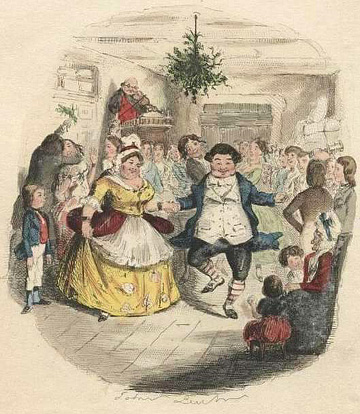As A Christmas Carol begins, Ebenezer Scrooge is one of the most unlikable characters in all of literature. Here, once again, is the full version of Charles Dickens’s classic description:
Oh! But he was a tight-fisted hand at the grindstone, Scrooge. a squeezing, wrenching, grasping, scraping, clutching, covetous old sinner! Hard and sharp as flint, from which no steel had ever struck out generous fire; secret, and self-contained, and solitary as an oyster. The cold within him froze his old features, nipped his pointed nose, shrivelled his cheek, stiffened his gait; made his eyes red, his thin lips blue; and spoke out shrewdly in his grating voice. A frosty rime was on his head, and on his eyebrows, and his wiry chin. He carried his own low temperature always about with him; he iced his office in the dog-days; and didn’t thaw it one degree at Christmas.
Don’t you love that description? Now there’s a man in need of an attitude adjustment, or, indeed, a life adjustment. And that’s exactly what happened to Ebenezer Scrooge, and in less than 100 pages! By the end of the story, here’s the new Scrooge:
Scrooge was better than his word [to Bob Cratchit concerning help for his family]. He did it all, and infinitely more; and to Tiny Tim, who did not die, he was a second father. He became as good a friend, as good a master, and as good a man, as the good old city knew, or any other good old city, town, or borough, in the good old world. . . . [A]nd it was always said of him, that he knew how to keep Christmas well, if any man alive possessed the knowledge.
What in the world can explain such a transformation? Why was Scrooge able to change? How did it happen?
We might begin by saying that nothing in this world can account for the transformation of Ebenezer Scrooge. He needed, and indeed, received supernatural assistance. The change in Scrooge is a direct result of the impact of four ghosts upon him, the spirit of his departed colleague Jacob Marley and the spirits of Christmas past, present, and future. The metamorphosis of a man like Ebenezer Scrooge requires other-worldly influence. In this regard, Ebenezer Scrooge is like his literary forefather Gabriel Grub (see my post entitled “The First Ebenezer Scrooge”), though Scrooge was haunted by ghosts rather than goblins. And, unlike poor Grub, Scrooge didn’t get physically pummeled into submission. The ghosts worked on Scrooge’s heart, not his body.
It wasn’t the mere fact of ghostly visitors that changed Scrooge, however, as if he had been scared into repentance. Rather, it was what he experienced with the spirits that made all the difference. Indeed, the ghosts weren’t really necessary for Scrooge’s transformation. It could have all been just a dream with the same result, although would have been much less fun.
The Impact of the Spirit of Jacob Marley
Before Scrooge is visited by Jacob Marley, he shows not the slightest bit of kindness or tenderness. His heart is hard. His focus is utterly self-centered. He has nothing to offer others but scorn and an occasional “Humbug!” Inhis interaction with Marley’s ghost, however, Scrooge first shows the tiniest morsel of positive feeling to anyone.
When the ghost of Jacob Marley visits Scrooge, he at first doubts the veracity of his visitor. In one of my favorite lines from A Christmas Carol, Scrooge argues that his vision is probably “an undigested bit of beef, a blot of mustard, a crumb of cheese, a fragment of an underdone potato. There’s more of gravy than of grave about you, whatever you are!” Yet with loud cries and a horrifying change of appearance, Marley’s ghost prevails upon Scrooge’s good sense, who finally believes that the ghost is real.
Scrooge’s first response to this recognition is fear and trembling. His fear grows when he learns that he is destined to wear even heavier post-mortem chains than the onerous ones that Marley himself is forced to carry. “Speak comfort to me, Jacob,” Scrooge begs, in his first real demonstration of some sort of human vulnerability. Yet Marley can offer no real comfort. (Photo: “Marley’s Ghost” by John Leech, from the first edition of A Christmas Carol).
Here we catch a glimpse of a speck of tenderness in Ebenezer Scrooge, though it is completely self-centered. He desires comfort because he is terrified to learn about the Hell that awaits him after death. Thus, the frozen heart of Scrooge begins to thaw just a smidgen, even if his feeling is still egocentric.
As Marley continues, he explains that he has come to warn Scrooge so that he might escape Marley’s dire fate, “a chance and hope of my procuring, Ebenezer.” To this Scrooge responds, “You were always a good friend to me, . . . Thank’ee.” Here is the first bit of tenderheartedness directed by Scrooge to someone other than himself.
What begins to thaw the frosty heart of Ebenezer Scrooge? It’s the fact that Marley has acted to help Scrooge. It’s Marley’s gift of undeserved kindness that first touches Scrooge’s soul.
Theological Reflections
Undeserved kindness. Theologians call this grace. I don’t think it’s an exaggeration to say that Marley extended grace to his former partner. In no way did Marley owe Scrooge anything. And there’s no reason to believe that Marley stood to gain anything for himself in helping Scrooge, other than, perhaps, the sense of having made a positive difference in Scrooge’s life (and afterlife). Moreover, in no way whatsoever had Scrooge done anything to deserve Marley’s help. Marley’s intervention was simply an act of grace. In fact, it was a demonstration of what theologians call prevenient grace.
Prevenient grace is, simply, grace that comes before anything we do. Prevenient grace takes the initiative. It gets the ball of transformation rolling. The fact that God’s grace is prevenient makes all the difference in the world. It means that we cannot do anything to earn God’s favor, nor must we. It means that God’s favor is given first, and everything we do for good is in some measure a response to that prevenient grace.
Although Dickens was not an enthusiastic Christian-his own faith seemed to be more of a romantic, deistic, Unitarian variety-his anthropology bore much in common with his evangelical contemporaries (of whom he was not particularly fond). According to both Dickens and the evangelicals, human transformation comes as a result of grace, grace that is communicated through a supernatural agent. Of course in the Christian case, grace comes from God, not a human ghost, and is delivered through the Holy Spirit, not the spirit of a dead colleague. Jacob Marley doesn’t appear in Scripture when I last checked. So when it comes to theology, A Christmas Carol isn’t especially Christian. But Dickens’s understanding of human nature is surprisingly similar to the Christian perspective in some ways. We change in response to grace, with the help of a supernatural spirit.
Though Scrooge’s initial experience of grace softens his stony heart just a bit, it hardly transforms it. This arduous task remains for the spirits of Christmas past, present, and future. To their work I’ll return in my next post in this series.

